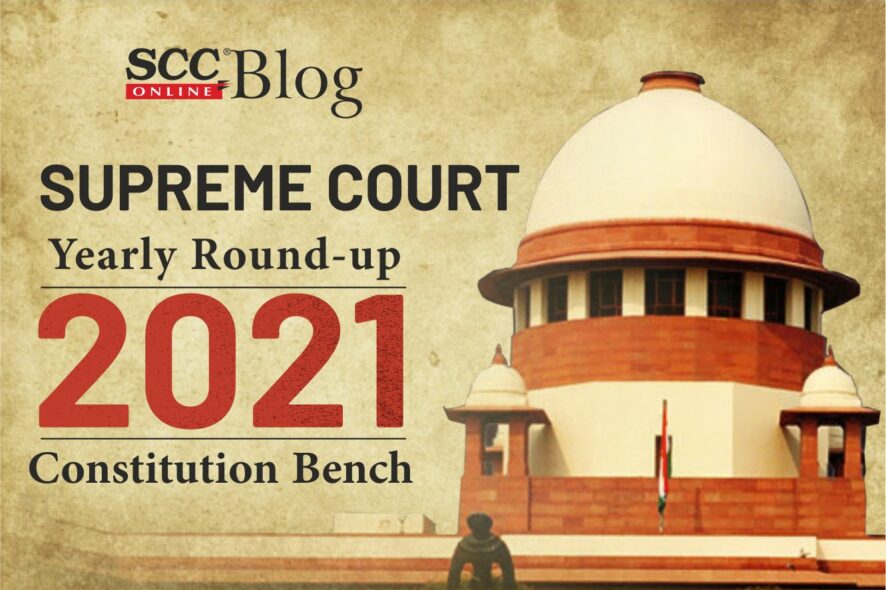Unlike the year 2020, the Supreme Court Constitution Bench has functioned limitedly in the year 2021, with the number of judgments delivered by the Constitution Bench being three.
As we bid adieu to the year 2021, here is a brief recap of all the developments advanced by the Constitution Bench of Supreme Court:
No more “mechanical” conversion of complaints under Section 138 NI Act from summary to summons trial; Magistrates “must” record reasons
5-Judge Bench: SA Bobde, CJ and L. Nageswara Rao, BR Gavai, AS Bopanna and S. Ravindra Bhat, JJ
Noticing that the summary trials of complaints filed under Section 138 of the Negotiable Instruments Act, 1881 are being routinely converted to summons trials in a “mechanical manner”, the Constitution bench has directed the High Courts to issue practice directions to the Magistrates for recording cogent and sufficient reasons while doing so.
The Court explained that in a case tried summarily in which the accused does not plead guilty, it is sufficient for the Magistrate to record the substance of the evidence and deliver a judgment, containing a brief statement of reasons for his findings. There is a restriction that the procedure for summary trials is not to be applied for any sentence of imprisonment exceeding three months. However, Sections 262 to 265 of the Code were made applicable “as far as may be” for trial of an offence under Chapter XVII of the Act, notwithstanding anything contained in the Code.
“It is only in a case where the Magistrate is of the opinion that it may be necessary to sentence the accused for a term exceeding one year that the complaint shall be tried as a summons trial.”
[In Re: Expeditious Trial of Cases Under Section 138 of N.I. Act 1881, 2021 SCC OnLine SC 325]
Maratha Reservation unconstitutional | The timeline of the case and the 3 questions that received unanimous opinions of all 5 judges
5-judge Bench: Ashok Bhushan, S.A. Nazeer, L. Nageswara Rao, Hemant Gupta and S. Ravindra Bhat, JJ
In a big development, the 5-judge bench has quashed the much in debate Maratha Reservation and has held that the Maharashtra State Reservation (of seats for admission in educational institutions in the State and for appointments in the public services and posts under the State) for Socially and Educationally Backward Classes (SEBC) Act, 2018 [ 2018 Act] as amended in 2019 granting 12% and 13% reservation for Maratha community in addition to 50% social reservation is not covered by exceptional circumstances as contemplated by Constitution Bench in Indra Sawhney[1]’s case.
[Jaishri Laxmanrao Patil v. Chief Minister, (2021) 8 SCC 1]
Adhaar | When 4:1 majority refused to review the Adhaar-5 Judges verdict but Justice Chandrachud dissented
5-judge Bench: A.M. Khanwilkar, D.Y. Chandrachud, Ashok Bhushan, S. Abdul Nazeer and B.R. Gavai, JJ
In spite of going through several rounds of litigation and long hours consideration, the Adhaar Controversy had once again popped up before the Supreme Court. The Constitution Bench addressed the review petition against the final verdict in K.S. Puttaswamy (Aadhaar-5 Judges) v Union of India, (2019) 1 SCC 1. Among the issues which arose for decision, the Court had to answer two critical questions:
- Whether the decision of the Speaker of the House of People under Article 110(3) of the Constitution, to certify a bill as a ‘Money Bill’ under Article 110(1) is final and binding, or can be subject to judicial review; and
- If the decision is subject to judicial review, whether the Aadhaar (Targeted Delivery of Financial and Other Subsidies, Benefits and Services) Act, 2016 had been correctly certified as a ‘Money Bill’ under Article 110(1) of the Constitution?
[Beghar Foundation v. K.S. Puttaswamy, (2021) 3 SCC 1 ]








Very nice